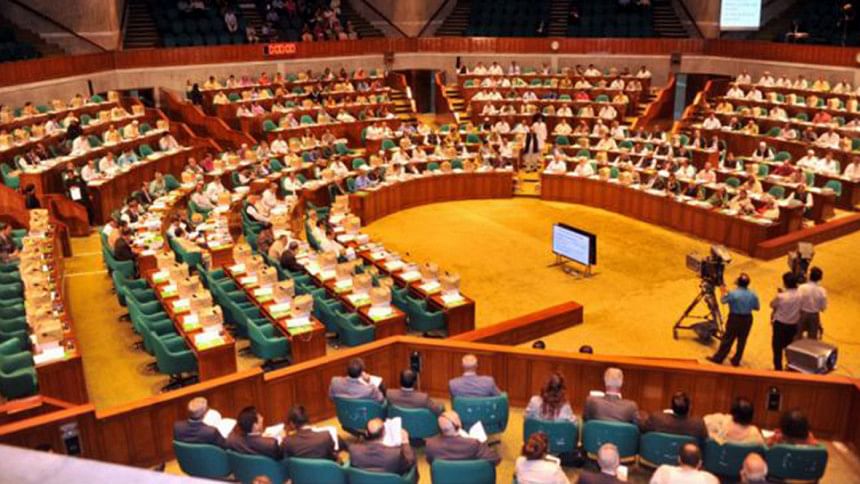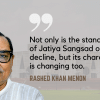News Analysis: An inconceivable resolution by JS

This is inconceivable in modern democracy that the parliament passes a resolution to nullify a supreme court verdict. But our Parliament unanimously did it on Wednesday, setting a unique example.
Its resolution called for taking proper legal action to nullify the SC's recent verdict that scrapped the 16th constitutional amendment. In addition, it sought legal step for cancellation of some "objectionable, unconstitutional and irrelevant remarks" made by the Chief Justice in the verdict.
The resolution followed a huge outcry in and outside of the Parliament against the apex court for more than a year.
Some ministers and MPs in Parliament launched a vociferous attack on the High Court immediately after it declared the amendment unconstitutional and void in May 2016.
Again, they did the same in Parliament after the Appellate Division upheld the HC verdict in July this year. In both occasions, they participated in unscheduled discussions.
The attack on the apex court by ministers and ruling party leaders intensified manifold after the release of the apex court's full verdict on the 16th amendment case early this August.
They accused the Chief Justice of "undermining" Bangabandhu Sheikh Mujibur Rahman's role during the country's Liberation War in 1971, an allegation that has no substance.
And finally on Wednesday in Parliament, more than a dozen ministers and MPs joined a marathon scheduled discussion. Some of them used abusive and indecent words to attack the Chief Justice.
In the past, the SC has declared unconstitutional and void four more constitutional amendments.
The present ruling Awami League has never blasted the apex court for scrapping three previous amendments—the 5th, the 7th and the 13th-- to the Constitution.
The nullification of the 5th amendment that validated the first martial law regime opened the window for the past AL-led government to bring major changes to the constitution in 2011.
Cancellation of the 13th amendment that had introduced the election time non-partisan caretaker government again provided the AL scope to abolish the caretaker government system in 2011 and to stay in power during the last election.
Twenty-seven years ago, in the fourth Parliament controlled by Ershad-led autocratic government, MPs launched a broadside against the apex court and its judges for the verdict to partially scrap the 8th constitutional amendment. They had done this in an unscheduled discussion and the then House did not pass any resolution.
Therefore, the vehement reaction of the AL against the cancellation of the constitution's 16th amendment that had empowered the Parliament to remove a SC judge on grounds of misconduct and incapacity took observers by surprise.
The passage of the resolution by the JS also raised the question whether the Parliament can enact a law to nullify the SC verdict.
An example of Indian Supreme Court's verdict will make it clearer. In May 2014, in the verdict on inter state water dispute case, the Indian Supreme Court ruled parliament and state assemblies had no power to enact laws to nullify judicial verdicts based on facts and findings.
“Under the pretence of power, legislature cannot neutralize the effect of the judgment given after ascertainment of fact by means of evidence/materials placed by the parties to the dispute,” said a constitution bench of Indian SC headed by then Chief Justice RM Lodha.
What does our government now want to do after the passage of the resolution by the Parliament?
Filing a review petition with the apex court seeking cancellation of the verdict or expunction of those "objectionable, unconstitutional and irrelevant remarks" from the verdict is also a legal step.
Will the government file review petition or move to do something extraordinary like passage of a law to nullify the SC's verdict?
In a democracy, the legislature, the executive, and the judiciary must function well and independently. It has been recognized worldwide for long that an independent judiciary is the cornerstone of democracy. Any attack on the judiciary amounts to putting the democracy, constitution, rule of law and citizens' rights at peril.
In recent years, the chief justices of Sri Lanka, Nepal, and Pakistan have faced the wrath of their governments for their strong, independent stances. This testifies that where democracy is fragile, the judiciary faces threat from the executive. The government attacks the courts when they question the government's arbitrary actions on legal grounds and declare them unlawful.
The continuous attack on the SC and CJ for the 16th amendment verdict may create the ground for Bangladesh to be put in the same bracket as Sri Lanka, Nepal and Pakistan.

 For all latest news, follow The Daily Star's Google News channel.
For all latest news, follow The Daily Star's Google News channel. 








Comments